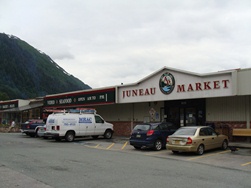A group of Juneau residents is exploring the idea of a cooperative grocery store at the soon to be vacant Alaskan & Proud Market on Willoughby Avenue.
When A & P — sometimes still called by its former name, Foodland — closes in early September, it will leave Juneau without a large-scale grocery operator downtown.
The co-op group hopes to fill the void, and keep ownership local.
KTOO’s Casey Kelly has more.
Audio Player
The idea for a co-op started almost immediately after A & P’s April announcement that the store would be closing. Greg Fisk is a business consultant, who’s been working for years on what he calls “downtown revitalization issues” in Juneau.
“There’s about 10,000 people in Juneau that live closer to the Foodland Center than to any other grocery store,” says Fisk. “So, it’s a very strategic location. It’s very important also because a lot people who work downtown shop there, and we think it could be a lot better than it’s been.”
Fisk told a neighbor about the co-op idea. The neighbor told more people, and soon an email group started. He says the vision is not the typical organic, health food co-op from the 1970s.
“A lot of people tend to think of co-ops as kind of funky, sort of hippy dippy things,” Fisk says. “But this is not the approach we’re taking. The grocery business is very competitive, narrow margins, so you have to really mind your Ps & Qs from a business sense.”
Fisk and co-organizer Evelyn Rousso recently attended the Consumer Cooperative Management Association conference in Philadelphia, where they got advice about how to organize a co-op and find sources of startup money.
Andrew Crow, Cooperative Program Manager at the University of Alaska Center for Economic Development also attended the conference.
“It’s a pretty common model. There are over 500 food co-ops in the country,” says Crow.
Simply put, a co-op is a member-owned business with a democratically elected board of directors. But Crow says in the case of a grocery store the business is open to everyone, like well-known outdoor retailer REI.
“There usually are discounts once a month or a couple times a month for people who are members,” says Crow. “But anybody can shop there.”
Crow says a group in Fairbanks plans to open Alaska’s first co-op grocery store this fall, looking to sell locally grown produce from the Interior. One of the benefits of a cooperative, he says, is more influence over how your store is run and what it carries.
“In Juneau, where the guys in Fairbanks are looking for more local potatoes, you guys would want to have more local seafood and higher quality meat,” Crow says.
At this point the Juneau group’s not even talking about what products the co-op would carry, except that it would remain a full service grocery store.
Rousso says they plan to incorporate this week under the name Capital City Market. A founding member drive will follow, with the goal of raising $12,000 for a market study to look Juneau demographics and buying habits.
The time frame is short, since A & P is scheduled to close in early September. Rousso says the group already has several pledges of monetary support.
“We feel pretty confident that that’s going to happen shortly,” says Rousso. “But the thing to realize is the market study is what’s going to tell us if this is realistic or not.”
Another potential obstacle is the uncertainty over the Foodland Shopping Center. The complex — owned by the Rosenberger family of Juneau — remains on the market for $13.5-million. Real estate broker John Williams declined comment, except to say the owners continue to search for a long-term grocery tenant.
Fisk originally thought the co-op might be a good backup plan if a major retailer isn’t found. But he’s increasingly of the mind that it’s the best option.
“The expression of support so far has been really, really great,” says Fisk. “Matter of fact, we’ve just been sort of holding off with people saying, ‘Well, when are you going to get out with a membership drive?’ and things like that. We’re a little ways away from that. But I expect we’re going to have really strong local support for this.”
And if another commercial grocer decides to move into the space, Fisk says at least the effort drew together a group that can tell the operator, ‘This is what we’d like to see in a store.’